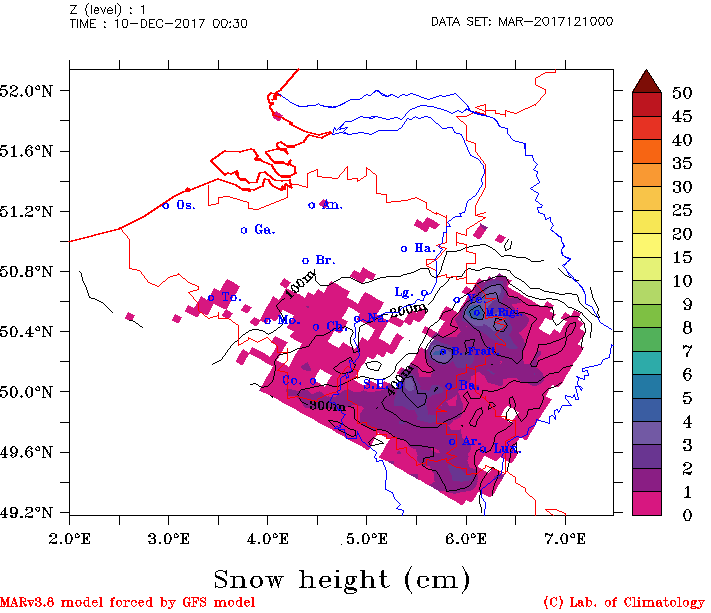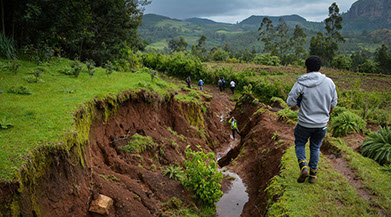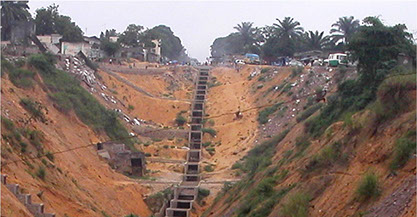We believe that high quality education integrates ongoing research in its courses, exercises and class discussions. As such, the Master in "Global change" (Climatology - Surface Processes - Human Dimension) is closely linked to fundamental and applied research activities conducted at the Department of Geography of ULiège. These research activities focus on Climatology, Geomorphology and Hydrology, and Environmental Geopolitics (Hugo Observatory). For example, students will learn:
- how to use (and help develop) regional climatic models;
- how to identify, understand and foresee natural hazards such as land sliding and flooding;
- how to plan for national and international migration associated with such environmental challenges.
Two tracks of this master can be followed: a master in two years (120 ECTS) and a master in 1 year (60 to 75 ECTS). The Master in 2 years (120 ECTS) is open to students with a relevant bachelor diploma (see access conditions). The first year consists of a common core, which includes various skill-oriented courses, as well as a set of relevant introductory courses focusing on the three key dimensions of global change: climate, earth-surface processes and societies. The second year offers opportunities to further specialize oneself in one of the three following subjects: (1) Climatology; (2) Geomorphology and Environmental Hazards; and (3) Human Dimension of Global Change (see cursus summary).
The Master in one year (60 to 75 ECTS) is open to students with a relevant master degree (see access conditions). This shortened program largely coincides with the second specialization year of the full program (120 ECTS), with a few additional courses depending on the students’ prior training. The one-year version of the master is completely offered in English.
The specialization in Climatology starts with a basic training focusing on climate modeling, the computer skills required for such modelling, climate-serie analysis, and using remote sensing data for climatic applications. During the specialization, the students will receive a solid training in meteorology, regional climate and vegetation modeling and oceanography and includes an internship at MeteoWing (the weather forecast service of the Belgian defence forces). Both applied climatology/meteorology (agro-meteorology, weather forecast …) and fundamental climatology (study of the polar regions, greenhouse gasses, climate model development …) are addressed.

Ci-dessus une animation montrant la capacité du MAR à simuler la neige observée ces derniers jours 10-12 décembre 2017 en Belgique (date et heure en haut à gauche). On a observé de la neige dimanche (10/11/2017) matin dans les régions de l’est du pays, cette neige a fondu dès l'après-midi. Lundi (11/12), c'était au tour de la Flandre et Bruxelles d’être touchées par la neige ce qui a occasionné de nombreux bouchons. Mardi (12/12), il y avait toujours plus de neige en Flandre que sur les sommets ardennais. Un autre phénomène similaire s’est déroulé à la période de Noël 2010, et le MAR est également parvenu à simuler parfaitement ce qu’il s’est passé .
The specialization in Geomorphology and Environmental Hazards starts with the acquisition of the necessary skills in GIS and spatial analysis, modelling earth-surface processes, and laboratory analyses techniques. This is done through a range of courses, excursions and field projects (in Belgium and abroad). The specialization focuses on understanding, predicting and mitigating environmental hazards (including, landslides, floods and land/soil degradation) at various spatial and temporal scales and is supplemented with a relevant internship. Depending on the interest of the student, this internship can focus on fieldwork or GIS and modelling applications.


The specialization in Human Dimension of Global Change focuses on the geopolitical aspects of environmental changes: the impacts of global change on migration and public health, climate negotiations and diplomacy, the environment-security nexus, etc. It is supplemented with an internship in an international organization, a think-tank, NGO, or a research center.

Each specialization also includes a research thesis where students will develop a personal research project. This work will be conducted in close collaboration with an active researcher as supervisor and includes opportunities to conduct terrain work overseas. Further details on the program can be found here (in French).

